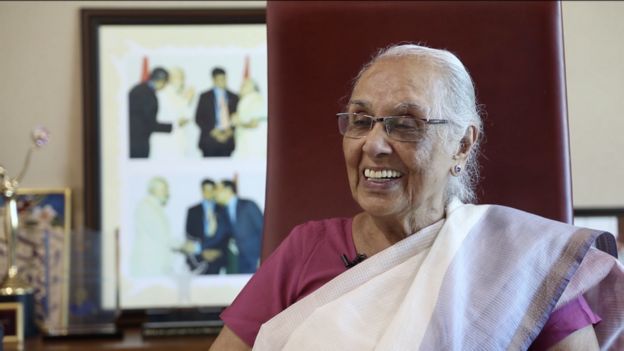Julekah Dawood received his medical training when there was no basic infrastructure in the UAE
Julekha Dawood of India is widely known as the first female doctor of the United Arab Emirates and has become a major contributor to the transformation of her health department. He met with BBC Hindi Jubair Ahmad.Currently 80-year-old physician Zulkeka recalls the day of his departure from Dubai in 1963.
"When I landed here, I found out that there was no airport, just a runway, and we felt an unbearable heat wave when we landed," he recalls.
Currently, the state-run hospitals, the number and the UAE's comprehensive health system, when viewed at one time in the UAE proper hospitals lack, from other countries, doctors brought to believe that katinamakummaruttuva for assistance United Arab Emirates afflicted days, the memories C of The doctor is nciyam julekka. From tuberculosis to diarrhea, people were infected with numerous diseases. There was no female doctor who could have had a baby, and children were suffering from nutritional deficiencies.
"I had never heard of it before it came to Dubai, so I realized how difficult it was to come here and how difficult it was to handle it."
There is no airport or port for the city. The use of the refrigerator was a distant dream. There is no basic infrastructure for concrete roads or a fixed power supply. Doctors from Dawood and other countries such as Syria and Lebanon refused to work under conditions.
But the doctor had a duty to do so.
"I continued my work because I felt I needed people here." He was trained as a midwifery doctor and was forced to act as a general doctor in Dubai due to inevitable reasons. "For burns, snake bites, skin problems and a variety of treatments" he was forced to further manage them because there were not enough doctors to look for medicine.
Dubai's visit to Doha, a doctor in Maharashtra's western state of Maharashtra, is not a planned one. Immediately after graduating from the medical college in Nagpur, he applied for work in a US missionary in Kuwait. Then he went to Dubai.
But how can a unmarried young woman be allowed to travel abroad from conservative Muslim community? He acknowledges that at this time it is unthinkable.
"My parents did not have proper education, but they were open-minded and encouraged me to go to Dubai," he said in a tentative hospital where the tribal residents lived in the desert area.
After working for a few months, Dawood reported that his employers should work in a small hospital in Sharjah.
"We were traveling through the desert because our road was not 12 km from Sharabi, and he was trapped in the soil," he recalls.
As his life progressed, he received more recognition. Local women saw him as a "special gift" for women in the area and gave him many awards.
Dr. Dawood grew up with the rapid development of medical facilities since the creation of the United Arab Emirates in 1971.
He suddenly jumped on the path of development and became entrepreneur. She is the employer of three major hospitals, including a cancer hospital in Nagpur.
"Since the creation of the United Arab Emirates, I have made rapid progress in all aspects of life, and I am a beneficiary of the rapid development of the country after independence," he said.
Dr. Dawood has great respect for the people of the United Arab Emirates. Zulekka says that the rulers of the country who encouraged her to set up hospitals have a special place in her heart.
The doctor, who had done more than half a century, decided to finally relax. He is now living a "semi-retired" life. He spends only two hours a day in his Sharjah hospital.
She still maintains her Indian passport and has strong relationships in her birth country.
But should he go back?
"If I belong to this place now, my relations with India will continue, where my people live, but now this is my home," Julekha said.

Comments
Post a Comment